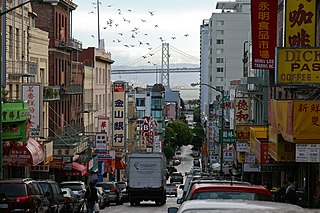
An advance-fee scam is a form of fraud and is one of the most common types of confidence tricks. The scam typically involves promising the victim a significant share of a large sum of money, in return for a small up-front payment, which the fraudster claims will be used to obtain the large sum. If a victim makes the payment, the fraudster either invents a series of further fees for the victim to pay or simply disappears.

A scam, or confidence trick, is an attempt to defraud a person or group after first gaining their trust. Confidence tricks exploit victims using a combination of the victim's credulity, naïveté, compassion, vanity, confidence, irresponsibility, and greed. Researchers have defined confidence tricks as "a distinctive species of fraudulent conduct ... intending to further voluntary exchanges that are not mutually beneficial", as they "benefit con operators at the expense of their victims ".

Manhattan's Chinatown is a neighborhood in Lower Manhattan, New York City, bordering the Lower East Side to its east, Little Italy to its north, Civic Center to its south, and Tribeca to its west. With an estimated population of 90,000 to 100,000 people, Chinatown is home to the highest concentration of Chinese people in the Western Hemisphere. Manhattan's Chinatown is also one of the oldest Chinese ethnic enclaves. The Manhattan Chinatown is one of nine Chinatown neighborhoods in New York City, as well as one of twelve in the New York metropolitan area, which contains the largest ethnic Chinese population outside of Asia, comprising an estimated 893,697 uniracial individuals as of 2017.

The Chinatown centered on Grant Avenue and Stockton Street in San Francisco, California, is the oldest Chinatown in North America and one of the largest Chinese enclaves outside Asia. It is also the oldest and largest of the four notable Chinese enclaves within San Francisco. Since its establishment in the early 1850s, it has been important and influential in the history and culture of ethnic Chinese immigrants in North America. Chinatown is an enclave that has retained its own customs, languages, places of worship, social clubs, and identity.
419eater.com is a scam baiting website which focuses on advance-fee fraud. The name 419 comes from "419 fraud", another name for advance fee fraud, and itself derived from the relevant section of the Nigerian criminal code. The website founder, Michael Berry, goes by the alias Shiver Metimbers. As of 2013, the 419 Eater forum had over 55,000 registered accounts. According to one member, "Every minute the scammer I'm communicating with is spending on me is a minute he is not scamming a real potential victim."
Like many other communities, the older Chinatowns face certain social problems. Although Chinatowns are now generally viewed and valued as tourist attractions, their earlier reputation was that of dangerous or dilapidated ghettos and slums, sites of brothels, opium dens, and gambling halls.

The pigeon drop or Spanish handkerchief or Chilean handkerchief is a confidence trick in which a mark, or "pigeon", is persuaded to give up a sum of money in order to secure the rights to a larger sum of money, or more valuable object. One of the con artists will typically claim to have found the money or valuable on the ground just before talking to the mark, or will even leave it on the ground and pretend to happen upon it at the same time as the mark, hence the term "drop."

The Golden Dragon massacre was a gang-related mass shooting that took place on September 4, 1977, inside the Golden Dragon Restaurant at 822 Washington Street in Chinatown, San Francisco, California, United States. The five perpetrators, members of the Joe Boys, a Chinese youth gang, were attempting to kill leaders of the Wah Ching, a rival Chinatown gang. The attack left five people dead and 11 others injured, none of whom were gang members. Seven perpetrators were later convicted and sentenced in connection with the murders. The massacre led to the establishment of the San Francisco Police Department's Asian Gang Task Force, credited with ending gang-related violence in Chinatown by 1983. The restaurant itself closed in 2006.

Mott Street is a narrow but busy thoroughfare that runs in a north–south direction in the New York City borough of Manhattan. It is regarded as Chinatown's unofficial "Main Street". Mott Street runs from Bleecker Street in the north to Chatham Square in the south. It is a one-way street with southbound-running vehicular traffic only.
The Chinese Consolidated Benevolent Association (CCBA) is a historical Chinese association established in various parts of the United States and Canada, with large Chinese communities. The association's clientele were Chinese immigrants of the late 19th and early 20th centuries, mainly from eight districts on the west side of the Pearl River Delta in Guangdong, southern China, and their descendants. The latter wave of Chinese immigrants, after 1965, who came from a much wider area of China, did not experience the level of hostilities faced by the pioneers and did not join the CCBA, which greatly lessened its influence.

San Francisco Chinese Hospital is a community hospital in San Francisco and the only Chinese hospital in the United States. The hospital is located in San Francisco's Chinatown.

Fortune telling fraud, also called the bujo or egg curse scam, is a type of confidence trick, based on a claim of secret or occult information. The basic feature of the scam involves diagnosing the victim with some sort of secret problem that only the grifter can detect or diagnose, and then charging the mark for ineffectual treatments. The archetypical grifter working the scam is a fortune teller who announces that the mark is suffering from a curse that their magic can relieve, while threatening dire consequences if the curse is not lifted.
The Jackson Boyz, JBZ or Jackson Street Boys, JSB are or were a San Francisco, California based Asian American street gang and criminal organization The gang, composed of Cantonese and Vietnamese members, has been centered in San Francisco's Chinatown, and was named for Jackson Street. The Jackson Street Boys also have a presence in other U.S. cities.

Chinatowns are enclaves of Chinese people outside of China. The first Chinatown in the United States was San Francisco's Chinatown in 1848, and many other Chinatowns were established in the 19th century by the Chinese diaspora on the West Coast. By 1875, Chinatowns had emerged in eastern cities such as New York City, Boston, and Philadelphia. The Chinese Exclusion Act of 1882 barred Chinese immigration to the United States, but the Magnuson Act of 1943 repealed it, and the population of Chinatowns began to rise again.
Five people were found dead at a home in Ingleside, San Francisco, United States on the morning of Friday, March 23, 2012. The victims, all Chinese immigrants, were an elderly couple, two of their adult children, and their daughter-in-law. In Chinese-language media both in the United States and overseas, which devoted the most coverage to the killings, the case was usually referred to as the Lei family quintuple slayings.
As of 2012, 21.4% of the population in San Francisco was of Chinese descent, and there were at least 150,000 Chinese American residents. The Chinese are the largest Asian American subgroup in San Francisco. San Francisco has the highest percentage of residents of Chinese descent of any major U.S. city, and the second largest Chinese American population, after New York City. The San Francisco Area is 7.9% Chinese American, with many residents in Oakland and Santa Clara County. San Francisco's Chinese community has ancestry mainly from Guangdong province, China and Hong Kong, although there is a sizable population of ethnic Chinese with ancestry from other parts of mainland China and Taiwan as well.
San Francisco currently has lower-than-average rates of violent crime when compared with other major U.S. cities, while property crimes, such as theft and burglary, are higher than the national average.
Fuzhounese Americans, also known as Hokchew Americans or Fuzhou Americans or imprecisely Fujianese, are Chinese American people of Fuzhou descent, in particular from the Changle district. Many Chinese restaurant workers in the United States are from Fuzhou. There are also a number of undocumented Fuzhounese immigrants in the United States who are smuggled in by groups such as snakeheads.

Jim Browning is the Internet alias of a software engineer and YouTuber from Northern Ireland whose content focuses on scam baiting and investigating call centres engaging in fraudulent activities.











